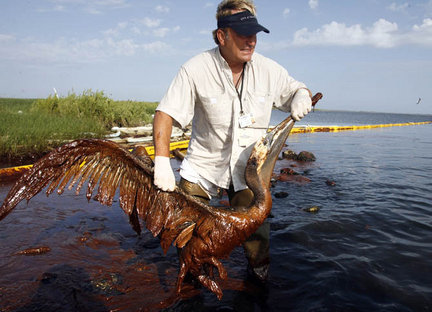Impacts of spill on Gulf Coast wildlife quickly coming into focus
By The Associated Press
June 05, 2010, 4:15PM The wildlife apocalypse along the Gulf Coast that everyone has feared for weeks is fast becoming a terrible reality. Pelicans struggle to free themselves from oil, thick as tar, that gathers in hip-deep pools, while others stretch out useless wings, feathers dripping with crude. Dead birds and dolphins wash ashore, coated in the sludge. Seashells that once glinted pearly white under the hot June sun are stained crimson. Scenes like this played out along miles of shoreline Saturday, nearly seven weeks after a BP rig exploded and the wellhead a mile below the surface began belching millions of gallon of oil. “These waters are my backyard, my life,” said boat captain Dave Marino, a firefighter and fishing guide from Myrtle Grove. “I don’t want to say heartbreaking, because that’s been said. It’s a nightmare. It looks like it’s going to be wave after wave of it and nobody can stop it.” … In Gulf Shores, Ala., boardwalks leading to hotels were tattooed with oil from beachgoers’ feet. A slick hundreds of yards long washed ashore at a state park, coating the white sand with a thick, red stew. Cleanup workers rushed to contain it in bags, but more washed in before they could remove the first wave of debris. … Back in Louisiana, along the beach at Queen Bess Island, oil pooled several feet deep, trapping birds against unused containment boom. The futility of their struggle was confirmed when Joe Sartore, a National Geographic photographer, sank thigh deep in oil on nearby East Grand Terre Island and had to be pulled from the tar. “I would have died if I would have been out here alone,” he said. … Gilly Llewellyn, oceans program leader with the World Wildlife Fund in Australia, said she observed the same behavior by dolphins following a 73-day spill last year in the Timor Sea. “A heartbreaking sight,” Llewellyn said. “And what we managed to see on the surface was undoubtedly just a fraction of what was happening.” The prospect left fishing guide Marino shaking his head, as he watched the oil washing into a marsh and over the body of a dead pelican. Species like shrimp and crab flourish here, finding protection in the grasses. Fish, birds and other creatures feed here. “It’s going to break that cycle of life,” Marino said. “It’s like pouring gas in your aquarium. What do you think that’s going to do?”
Impacts of spill on Gulf Coast wildlife quickly coming into focus
